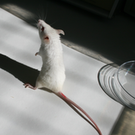Articles tagged with: Cancer Vaccine
NewsFlash »
Panobinostat In Combination With Velcade Shows Potential For Relapsed Multiple Myeloma (ASH 2009) – Researchers presented results at the American Society of Hematology Meeting (ASH) from a Phase 1 clinical trial that show that oral panobinostat (Farydak, LBH589) in combination with intravenous Velcade (bortezomib) has anti-myeloma effects. Researchers tested different doses of both panobinostat (10 mg to 30 mg) and Velcade (1.0 mg/m2 to 1.3 mg/m2). They found frequent blood-related adverse events, such as thrombocytopenia (low blood platelet count) and neutropenia (low white blood cell count). They concluded that dosing will be modified for future Phase 2/3 studies. For more information, please see abstract 3852 on the ASH meeting Web site.
Afinitor Is Safe In Relapsed And Refractory Multiple Myeloma; Drug Will Move To Phase 2 Clinical Trials (ASH 2009) – Afinitor (everolimus) is safe in relapsed and refractory multiple myeloma, according to preliminary results from a Phase 1/2 clinical trial presented at the 2009 Meeting of the American Society of Hematology (ASH). Afinitor was given orally at 5 mg to 10 mg daily. Researchers observed only one case of thrombocytopenia (low platelet count). A sufficient amount of anti-myeloma activity was observed for this drug to continue to Phase 2 testing, which puts more emphasis on the efficacy of the drug. For more information, see abstract 3850 on the ASH annual meeting Web site.
ACE-011 Increases Hemoglobin And Helps Build Bone In Multiple Myeloma Patients Receiving Chemotherapy (ASH 2009) – Preliminary results from a study presented at the 2009 Meeting of the American Society of Hematology (ASH) reveal that ACE-011 (sotatercept) increases hemoglobin (an iron-rich protein in red blood cells) and bone formation, decreases bone pain, and has anti-tumor activity in multiple myeloma patients receiving chemotherapy. A low hemoglobin count indicates a low red blood cell count (anemia), which is a common complication in multiple myeloma, as are bone lesions, and bone pain. All participants were on a regimen of melphalan (Alkeran), prednisone, and thalidomide (Thalomid). For more information, see abstract 749 on the ASH meeting Web site.
Researchers Demonstrate Feasibility And Safety Of Vaccine In Multiple Myeloma (ASH 2009) – Preliminary results from a Phase 1 clinical trial of a multiple myeloma vaccine, presented at the 2009 Meeting of the American Society of Hematology (ASH), indicate that using a vaccine in multiple myeloma is possible and that it is safe and tolerable. The study included 15 patients who had undergone peripheral blood progenitor cell transplantation – a treatment in which stem cells are collected from the bloodstream of a healthy donor and delivered to the myeloma patient after high-dose chemotherapy. The most frequent side effects were local skin reactions, typical of most vaccines. Further studies will evaluate the vaccine’s full potential. For more information, see abstract 1858 on the ASH meeting Web site.
For more information about myeloma-related studies covered at ASH, please see the Myeloma Beacon coverage of the ASH 2009 Meeting.
News»

Researchers have announced that in initial tests, a multiple myeloma vaccine protected some mice from developing cancer and helped those with established tumors to enter remission.
In the current study, researchers constructed an anti-myeloma vaccine by isolating proteins from myeloma tumor cells. After inoculation, the vaccine prompts antibodies to develop against myeloma proteins, which in turn causes the immune system to view myeloma cells as “foreign” and destroy them. This form of cancer treatment, known as “immunotherapy,” provides an alternative or additional option to chemotherapy.
The study authors first vaccinated healthy mice …
